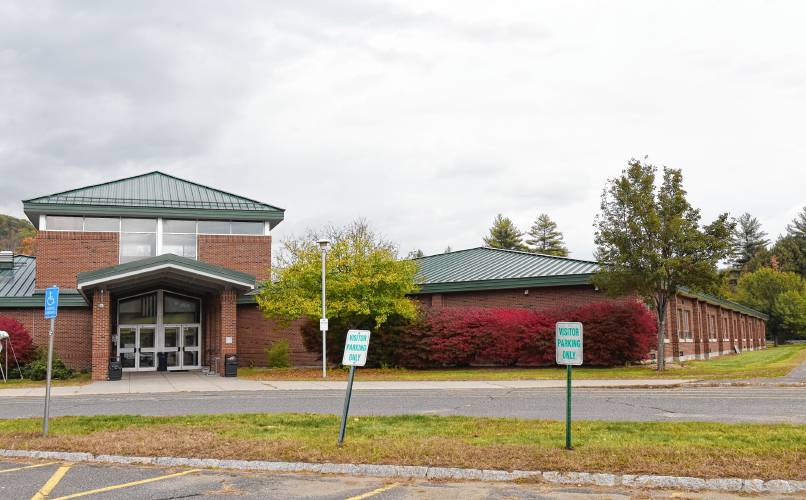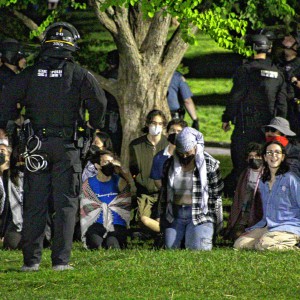Mohawk Trail’s regional agreement changes coming back to towns

Mohawk Trail Regional School in Buckland. Staff File Photo/Paul Franz
| Published: 03-13-2024 12:00 PM |
BUCKLAND — Following a vote from the School Committee, the Mohawk Trail Regional School District intends to reintroduce the same regional agreement amendments that failed to receive approval from all eight member towns last year.
“We can change the minds of the folks who voted ‘no’ the first time,” School Committee Chair Martha Thurber said in an interview. “We have a job to do, trying to share our perspective and how the amendment will affect” the towns.
Last year, during Annual Town Meeting season, the committee asked the towns to vote to change the regional agreement to better align with the state formula for calculating enrollment. While the state’s enrollment formula takes into account every child attending public schools — including School Choice and charter students — in what it calls its “foundational enrollment” for determining state aid, Mohawk Trail’s formula for calculating enrollment, which in turn is used to calculate town assessments, does not.
By comparison, town assessments are determined by counting the number of students enrolled on a five-year rolling average. This is called “complete enrollment.” Depending on the ratio of students enrolled over those five years, each town pays its portion of the school budget. This number does not include School Choice students, charter students and students who enrolled in different districts due to special needs services not offered by Mohawk Trail.
The School Committee has touted this change as improving the equity of assessments for all member towns.
“We are looking at it from a district perspective,” Thurber said. “It is fair and equitable that the towns pay for their own students.”
There is one change in this year’s version of the agreement, however, that was not presented to towns last year. In Section 4B regarding capital expenditures, the district removed the word “maintaining” and replaced it with “remodeling or making extraordinary repairs.” This change was prompted by complaints from a Shelburne resident.
All member towns need to approve the changes for the regional agreement to be altered. Last year, five of the eight towns in the district approved the amendment at their Annual Town Meetings. Given the majority of the towns approved the changes, the three that did not — Plainfield, Shelburne and Heath — were asked to hold Special Town Meetings to vote again.
Article continues after...
Yesterday's Most Read Articles
 Retired police officer, veteran opens firearms training academy in Millers Falls
Retired police officer, veteran opens firearms training academy in Millers Falls
 UMass graduation speaker Colson Whitehead pulls out over quashed campus protest
UMass graduation speaker Colson Whitehead pulls out over quashed campus protest
 As I See It: Between Israel and Palestine: Which side should we be on, and why?
As I See It: Between Israel and Palestine: Which side should we be on, and why?
 Real Estate Transactions: May 10, 2024
Real Estate Transactions: May 10, 2024
 Baseball: Caleb Thomas pitches Greenfield to first win over Frontier since 2019 (PHOTOS)
Baseball: Caleb Thomas pitches Greenfield to first win over Frontier since 2019 (PHOTOS)
 High Schools: Greenfield softball squeaks out 1-0 win over Franklin Tech in pitchers duel between Paulin, Gilbert
High Schools: Greenfield softball squeaks out 1-0 win over Franklin Tech in pitchers duel between Paulin, Gilbert
Shelburne held its Special Town Meeting and the amendments were approved. However, members of the Heath Selectboard voted not to hold a Special Town Meeting, saying their decision “centered on needing the time to research and verify the article.” Although Plainfield was ready to hold a Special Town Meeting, town officials decided not to after Heath made its decision, making Plainfield’s vote moot.
“With that level of support [for the regional agreement revisions] and the fact that we, as a committee, believe they make the assessment much fairer and more equitable for all towns, we decided to resubmit the agreement for all Town Meetings,” Thurber said.
The timing of bringing the three-article, 17-page amendment to the towns was also criticized last year for being too close to the Annual Town Meeting dates. Many said the timing did not allow the towns ample time for research.
“We are better prepared,” Thurber said. “Towns can have more time to think about it.”
Thurber said the committee will provide a financial analysis of how the new formula works, using real enrollment numbers. However, the committee does not intend to show what this change may cost the towns in the future because this would involve enrollment projections.
“We don’t think it is possible to anticipate how much it will cost or save individual towns,” Thurber said.
During the most recent School Committee meeting, which involved lengthy discussion, a minority of members voted against bringing these amendments back to the towns this year because the district is undergoing a sustainability study. Dissenting members said the results of the study might inspire more changes to the regional agreement and proposed that a comprehensive review of the agreement be done once the study is complete.

 Montague Notebook: May 10, 2024
Montague Notebook: May 10, 2024 Deerfield’s Tilton Library expansion ‘takes a village’
Deerfield’s Tilton Library expansion ‘takes a village’ UMass student group declares no confidence in chancellor
UMass student group declares no confidence in chancellor
